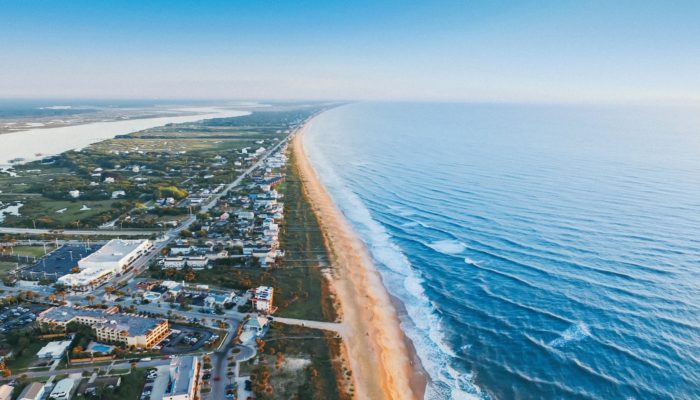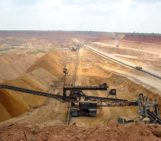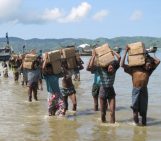Each month, Jesse Zondervan picks his favourite posts from geoscience and development blogs/news which cover the geology for global development interest. Here’s a round-up of Jesse’s selections for the last month:
As Greta Thunberg hits the news with her zero-carbon crossing of the Atlantic, this month discussion on adaptation to climate change is voluminous. Coverage of climate change follow seven distinct frames, depending on the economy and other characteristics of countries, found a US/Vietnam based study.
Where in rich countries the focus lies on science and new discoveries, in low-resource countries the focus tends to be on international relations or natural impacts of climate change. Social progress and the potential for solving problems is the least popular frame, but arguably the most important.
Whilst the media and governments are grappling with adapting to climate change, litigation of companies causing emissions or neglecting climate risk to their facilities and infrastructure starts to really take off. This is driven partly by insuring companies, compensating damage whilst chasing irresponsible companies for negligence.
Though climate change claims and suits threaten any industry linked to hydrocarbons and greenhouse gas emissions, such as transport, manufacturing, agri-business, and finance, the biggest group of companies does not view it as strategic yet. This might change soon as the push for climate-change-related risk reporting in business intensifies.
How to make progress through communicating and applying science
So where is the potential for solving problems? Climate change adaptation planning always makes assumptions, and whether these are reasonable is up for debate. That is why geoscientists at Pennsylvania State University argue there is for wider use of Earth science to identify effective strategies for climate risk management.
Another opportunity for climate researchers to help out is by contributing to Wikipedia, especially information on the Global South, which is underrepresented on the wiki whilst it is overlooked as a communication platform beyond the scientific audience.
Geoengineering – yes/no or are we already doing it?
There is limited knowledge on how geoengineering techniques might affect the environment, making it a risky business for now. Analogies for solar geoengineering are often based on volcanic eruptions. But how accurate is this?
A new study based on numerical models suggests that unlike the disruption of rainfall patterns after a volcanic eruption, the sustained deployment of a geoengineering system would be less significant.
Another study published in Nature Communications this month takes a whole different perspective, arguing we are already geoengineering the ocean by the input of industrial iron fertilizing it. The study found at least half if not all the soluble iron in the air masses of Europe and North America derives from human activities.
Indeed, another study from UC Santa Barbara finds in over half of the oceans the cumulative human impact is increasing significantly and overall has doubled in the recent decade.
As always, there is more to read. Go ahead!
Climate Change Adaptation
Climate change is global—but climate journalism isn’t by Sarah DeWeerdt at Anthropocene
Climate liability is on the rise. Here’s what it looks like by Jennifer Hijazi at E&E News
Investing in Science to Improve Climate Risk Management at Eos
OPINION: Why I believe climate change researchers should contribute to Wikipedia by Katharine Vincent at the Climate and Development Knowledge Network
NEWS: Edit-a-thon helps tackle Wikipedia’s Africa gap by Lisa McNamara at the Climate and Development Knowledge Network
CDP reporting data suggests world’s biggest firms are underestimating climate risks at Acclimatise News
Desertification: A Serious Threat To Southern Europe by Ana Garcia Valdivia at Forbes
The case for retreat in the battle against climate change at ScienceDaily
Ethiopia’s future is tied to water – a vital yet threatened resource in a changing climate by Meron Teferi Taye and Ellen Dyer at The Conversation
Unpicking the datacentre industry’s complicated relationship with climate change by Nicholas Fearn at Computer Weekly
Climate Change Is Making Hawaii’s Beaches More Dangerous by Nathan Eagle at Civil Beat
Sustainability
Human impacts on oceans nearly doubled in recent decade at ScienceDaily
17 Countries, Home to One-Quarter of the World’s Population, Face Extremely High Water Stress at the World Resources Institute
Geoengineering
While we debate geoengineering the ocean, it seems we’re already doing it by Sarah DeWeerdt at Anthropocene
Geoengineering versus a volcano at Carnegie Science
Disaster Risk
Meteotsunami Spotted for the First Time in the Persian Gulf by Katherine Kornei at Eos
‘100-year’ floods will happen every 1 to 30 years, according to new flood maps at EurekAlert
External Opportunities
Opportunity: Senior Research Associate in Low-Carbon Lifestyles and Behaviour, UEA
Check back next month for more picks!
Follow Jesse Zondervan @JesseZondervan. Follow us @Geo_Dev & Facebook.




